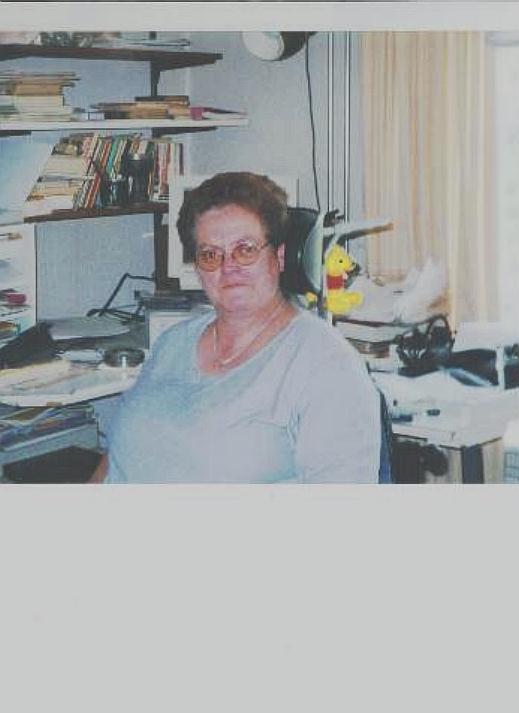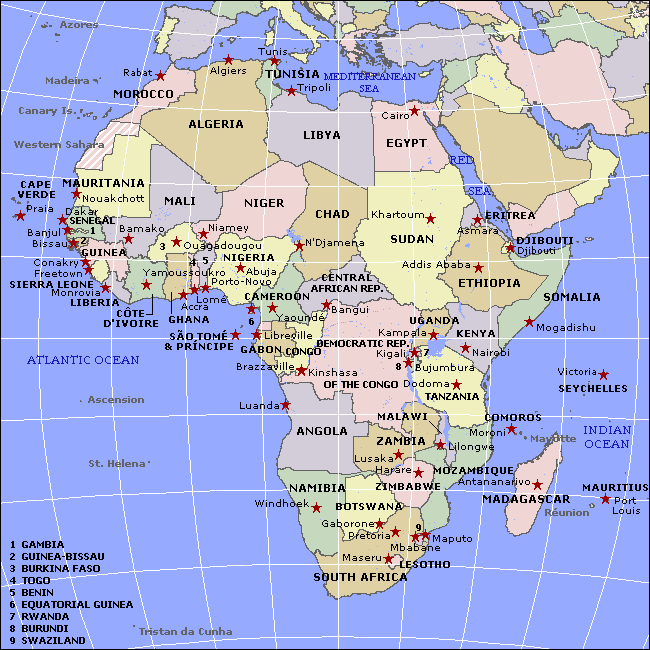| Home Page
Africa maps
Democratic Republic of The Congo
Latest News
Malawi
Custom3 Page
Favorite Links
Custom4 Page
Photo Page
Photo2 Page
Slide Show
Custom Page
|
   
Welcome to my Homepage about AFRICA
It will mainly be about the Democratic Republic of the Congo. As I feel that there is too little information available about the DRC and my cousin is a missionary there.
Africa is an enormous continent with 50 different countries of varying size and importance.
At this present time famine is a grave problems in the southern regios.
Aids is rif thoughout large parts of Africa, as are several diseases which no longer prove any great problems for us in Europe. |
 |
Pictures of Africa as Continent and the indiffidual countries
|
NewsThursday, 11 July, 2002, 20:55 GMT 21:55 UK
Ethiopia's new-found plenty
Tsige: "Now I can feed my children"
By David Loyn
BBC developing world correspondent
Parts of northern Ethiopia, which were badly hit by famine a generation ago, are now exporting a food surplus and are confident that they can survive a year without rain.
The famine of 1984 shocked the world, inspiring pop stars to come together for the Live Aid concert on 13 July 1985.
The earth can give us food under its own terms
Dr Tewolde Berhan Gebre Egziabher
That famine was caused by a combination of factors including conflict and bad government, but the over-riding reason for mass deaths was the prolonged drought.
Now a unique scheme in the Axum area is working to conserve water in the years of plenty and improve soil fertility so that in years when the rains do not come, people are better suited to face the hardship.
Escape from poverty
Tsige Gebre Abzgi has more cause than most to remember the 1984 famine.
She watched her oldest son die of starvation.
Now she has rebuilt her house and is confident of being able to face the hard times.
"I used to be poor," she says.
"But now I can feed my children. They go to school. I have shoes and clothes, and I have improved my home."
When she first began to develop the land she faced opposition from her neighbours and success has only come from the whole community coming together with support from government agencies.
Organic farming
There was no single magic solution.
Their success has come from a combination of factors.
Survivors of the famine can now fend for themselves
They have shored up the walls of their fields to conserve the soil, stopped over-grazing by cattle so that trees and shrubs grow and stopped using chemical fertiliser.
The guru of sustainable development in Ethiopia, Tewolde Berhan Gebre Egziabher, says that fertilising the land using compost was one of the main keys to their success.
The scheme, he adds, faced significant opposition at first because it turned its back on chemical fertilisers.
"It was free and so it was opposed by those who want a market. It benefited the peasant farmer and not the merchant."
The scheme in the Adi Nifas village was so successful that a number of other villages followed the plan and now the nearby market in Axum is thriving where a generation ago people were starving to death.
Ethiopian lesson
Dr Tewolde says that the world should learn a lesson from Adi Nifas.
He says that the world will face a major food crisis in the 21st century if it continues down the road of intensive farming, using heavy chemical fertilisers and pesticides.
Precious rainwater is quickly conserved for the dry periods
'The earth can give us food under its own terms," he says.
"We have sliced up the earth into marketable products. If chemical fertilisers could fit in there would be no objection. But they don't.
"Every time that agriculture is intensified a problem is created. We must go back to actually paying attention to what is inside the soil."
While Ms Tsige is now feeding her family securely for the first time in her life, she also has time to make a little beer to sell to passers-by on Saturday nights.
And organic farming had an unexpected bonus.
Not only do the grains go further in cooking because they are bigger and better than grain grown by chemical fertiliser, but she says the food tastes better.
Thursday, 18 July, 2002, 14:04 GMT 15:04 UK
DR Congo-Rwanda peace talks begin
Peace has been hard to find in DR Congo
Peace talks between the governments of the Democratic Republic of Congo and Rwanda have opened in the South African capital, Pretoria.
The talks, chaired by the South African Deputy President Jacob Zuma, are aimed at finding a solution to the four year conflict between the countries.
DR Congo's president wants the Rwandan troops out
Rwandan troops entered DR Congo in 1998 and in alliance with rebels of the Rally for Congolese Democracy (RCD), launched a war against the Kinshasa government.
There are more than 30,000 Rwandan troops in DR Congo, according to the BBC's Kinshasa correspondent, Mark Dummett.
The meeting in Pretoria follows talks at the African Union summit in Durban last week between President Joseph Kabila of DR Congo and President Paul Kagame of Rwanda.
The focus of the talks in Durban was the creation of a neutral zone along their border and the presence in this zone of United Nations forces.
Security threatened
No agreement on such a zone was reached in Durban and the governments differ greatly over Rwanda's actions in Dr Congo.
President Kagame says his troops are in eastern DR Congo to ensure Rwanda's security against the threat posed by Rwandan Hutu rebels.
Rwanda accuses the Kinshasa government of supporting the rebels.
President Kagame says Hutu rebels in DR Congo are a threat
Mr Kabila's government says that Rwanda wants to annex its territory.
Rwandan troops in DR Congo have been involved in fighting in the east of the country in recent weeks.
More than 50,000 people have fled the fighting in the Uvira region between Rwandan troops and their RCD allies on one side and forces of the Banyamulenge, ethnic Tutsis living in DR Congo on the other.
Marathon talks
The Banyamulenge forces were allied to the Rwandans and the RCD, but split from them earlier this year.
The United Nations and international aid agencies have sent a mission to Uvira to evaluate the needs of the local population and the displaced people.
Past attempts to end the suffering have concentrated on finding a consensus between the many Congolese parties.
Marathon talks earlier this year between more than 350 representatives of the government, rebel factions, militias, political parties and civic associations failed to come up with any significant solution, our correspondent says.
The RCD attended the talks but could not reach an agreement with the government.
Diplomatic efforts are now focusing on what is perceived to be the main stumbling block to peace, the presence in eastern Congo of more than 30,000 Rwandan troops and their alliance with the RCD.
When the presidents of Rwanda and DR Congo met in Durban, Rwanda suggested the creation of a buffer zone along the DR Congo eastern border patrolled jointly by Rwandan DR Congo and UN forces.
This has been rejected by President Kabila's government, which wants Rwanda to withdraw its troops immediately.
|
|

News from South AfricaThursday, 11 July, 2002, 06:02 GMT 07:02 UK
New appeal to avert Africa famine
Crops are failing across southern Africa
By Alastair Leithead
In Johannesburg
The World Food Programme (WFP) is to renew its call for aid in southern Africa, as famine continues to threaten the lives of millions.
Donations amounting to have already been received since the WFP appealed for a million tonnes of food aid to help combat shortages across the region.
The United Nations agency has warned that 13 million people in southern Africa will need supplies of food over the next nine months, and it is asking again for to help avert disaster.
Famine crisis:
Trail of hunger
Zambia's plagues Angola famine Malawi's tragedy Zimbabwe failure Lesotho's needs
Some donations have already been received.
The head of the WFP, James Morris, describes the situation as "the most severe crisis in the world".
The WFP believes the window of opportunity for donations to make an impact is closing, as the crisis is expected to deepen in September.
The call for more donations coincides with a warning from the World Health Organisation.
It says 300,000 people could die of hunger before the end of the year in six African countries - the worst affected being Malawi and Zimbabwe.
Erratic rainfall has been blamed for the food shortages, but political instability and government mismanagement has no doubt contributed to the looming crisis.
Africa a wonderful Continent.
Please join me in praying for this vast continent which has suffered so much in the past from the slave trade and colonization and which continues to suffer today from HUNGER DROUGHT and AIDS.
Blessed Lord Creator of all creation hear our prayers for Your children in Africa.
Lord please grant that the famine facing Southern Africa may end and that all people throughout Your world may have suficient to eat.
Lord please grant us all the grace to help our brothers and sisters in Southern Africa.
We ask this in The Name of Jesus Christ Your Son and Our Saviour Amen
m.mcgoff@chello.nl |
|

